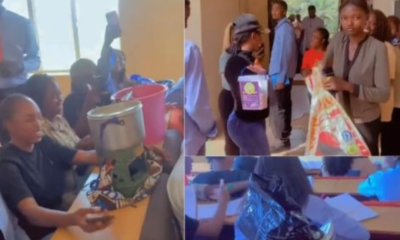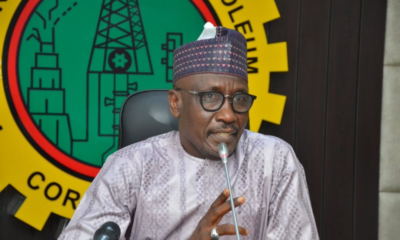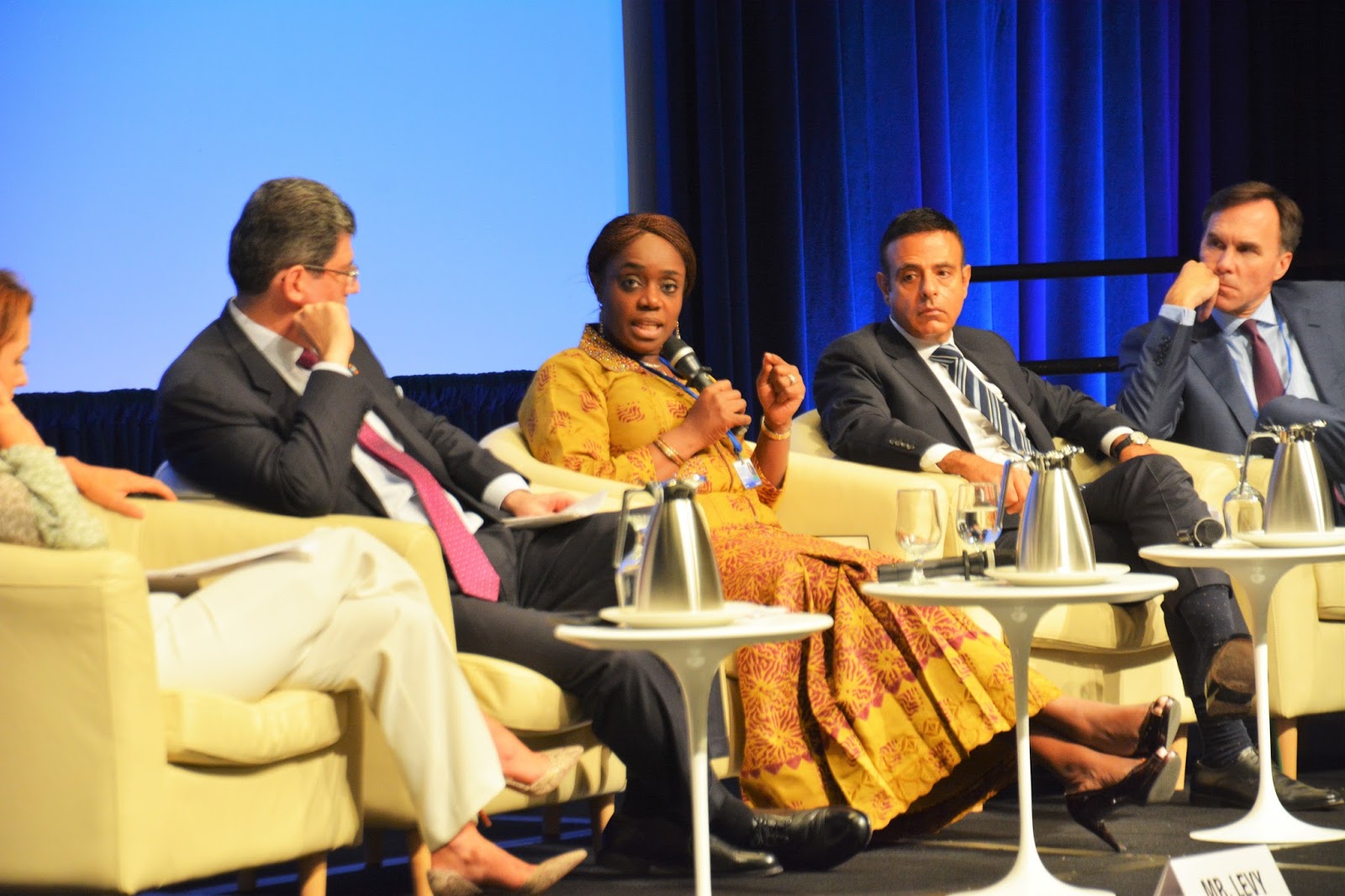Economy
“Nigeria Hungry For Infrastructure, Not Iphones” – Adeosun To World Bank
The Minister of Finance, Mrs. Kemi Adeosun, has informed multilateral donor institutions and investors that Nigeria is hungry for infrastructure that can trigger growth, not iPhones and pricey suits that will drive consumption.
Adeosun spoke Wednesday night at a session during the International Monetary Fund (IMF)/World Bank annual meetings in Washington D.C., saying investors must start to realise that western economies are matured and offer lower returns, while Africa with its infrastructure gap offers greater returns.
The minister made the remarks on the heels of the announcement by the IMF that it would offer zero interest rate on its concessional lending facility from 2016 to 2018 to Nigeria and other low-income economies that are in dire need of financial support to boost their economies and overcome challenges as a result of low commodity prices.
Adeosun said: “It seems very simple, in terms of what needs to be done. We are quite excited about negative interest rates. We like that you’re not earning any money.
“We are happy to take your money and give you very small positive interest rate. We think that the time has come, everyone is thinking out of the West, but there is nothing left in the West, everybody has to now come to Africa.
“But we don’t want investors to come to Africa to sell us iPhones and many expensive suits.
“We want to become productive, so we want this investment to come into infrastructure that will enable us to compete and really enable Africans to stay in Africa.”
She informed her audience that Nigeria has started a journey, which would take its economy from being dependent on oil as a primary commodity, to a more productive economy.
Adeosun said the economy had moved from spending 90 per cent of its budget on recurrent items and only 10 per cent on capital expenditure, to 70 per cent on recurrent expenditure and 30 per cent on capital expenditure.
“From the numbers that we have done, the infrastructure gap that we face, even if we devote our budget for the next three years, it is not enough, so we’ve got to look for creative ways to mobilise additional capital.
“We started of course with spending our own money (pension funds) because we think, of course, that the first thing we have to do is to re-establish some benchmarks, some ability to deliver on roads, on rails, on basic infrastructure,” she said.
According to her, Nigeria’s long-term plan is to mobilise private capital. “We think the narrative around who pays for infrastructure is a very important one in Africa. I say that because at the moment, if you don’t have infrastructure, you are going to pay anyway. If you spend six hours on a journey that should take you an hour, you’ve paid.
“So how do we convert that payment, which is currently informal and very painful, into a formal payment and therefore turn to a revenue stream that could attract investors, That is the challenge that we are working on now.
“As I have said, we are leading with our own money. We are looking at a regulatory framework that would enable investors to come in. We know it’s a new market and we are going to de-risk it.
“So what we are starting with are just infrastructure bonds that we guarantee, and then hopefully, when investors get an appetite for what the Nigerian infrastructure framework can provide them in terms of returns, we believe, we’d be able to remove some of the safeguards needed at the moment.
“We are hungry for infrastructure. We’ve got 170 million people who don’t have power in sufficient quantities, we don’t have a rail system, we don’t have a road structure, we believe that if we solve these infrastructure challenges, the entire productivity chain — agriculture, solid minerals, manufacturing, our unemployment problems — could all be solved.
“Our population is young; we have to provide a standard of living that keeps young vibrant Africans in Africa, because we think that is very important for eliminating poverty,” the minister stated.
IMF Offers Zero Interest Rate
The finance minister’s remarks came after the IMF said it was offering zero interest rate on its lending facilities between 2016 and 2018 to Nigeria and other low-income countries that are in dire need of financial support to boost their economies.
Addressing the media at the ongoing World Bank/IMF annual meetings, the Managing Director of the IMF, Ms. Christine Lagarde, said the policy was expected to help countries that are members of the donor institution absorb future shocks and continue their efforts to achieve deeper and more sustainable economic growth in line with sustainable development goals.
Despite the concession being dangled by the fund, THISDAY reliably gathered from a top official at the Ministry of Finance, that Nigeria might not be interested in borrowing from the IMF because of the conditionalities that are usually associated with loans from the fund.
Africa’s top oil exporter has been hit by low oil prices and depleted foreign reserves that have plunged the country into recession.
The National Bureau of Statistics (NBS) recently revealed that the country’s GDP contracted by 2.06 per cent in the second quarter of 2016, compared to the negative growth of 0.36 per cent recorded in the first quarter.
The country recently got a lifeline from the African Development Bank (AfDB), with the bank stating that it would support the country with the sum of $1 billion to help it address the N2.2 trillion deficit in the 2016 budget.
It is also in talks with the World Bank to plug its budget deficit, just as it is getting set to issue a Eurobond.
Continuing, Lagarde said the IMF board took the decision on the zero interest rate, which is in alignment with most developed economies, in view of the challenges facing some low income countries, including Nigeria.
“If we must improve the inequality issue, we must have a strong international safety net. In this context, I am pleased to reveal that our board recently approved the extension of zero interest rate on all concessional facilities from 2016 to 2018, and thereafter, if there is need for extension.
“That is really important for low-income countries to be able to actually absorb the shocks without necessarily going to the international markets or relying on bilateral lending capacity of close to a trillion dollars by extending access to bilateral borrowing agreements.
“The new agreements that are being signed this week will run at least through the end of 2019, and will continue to serve as a third line of defence.
“As you know, the first line of defence is the quota, second line are new arrangements to borrow, and the third line of defence will be those bilateral loans.
“We have so far received pledges of $344 billion from 26 members. We look forward to others joining this effort. We will provide more details shortly, and there will be some signing sessions organised in the course of the next two days,” she explained.
According to Lagarde, the outlook for advanced economies remained subdued, while the outlook for developing economies provide some guarded optimism with great diversities within the various economies.
“We also believe that each country has something to offer. My hope is that at the end of these meetings, each finance minister, each governor of central banks will go back home thinking of what to fuel growth.
“For example, when the monetary policy has been over-stretched, fiscal policy can step up. This will also put in place the structural reforms that are much needed, which have been sorted out in some countries, but which are still lacking in other places,” she added.
Also speaking at a separate media briefing yesterday, the President of the World Bank Group, Jim Yong Kim, noted that a lot of developing countries continue to struggle amidst a sluggish global economy.
He stressed that a lot of countries had been hit by falling commodity prices and stagnating global trade.
He pointed out that “we now have the highest number of developing countries in recession since 2009”, adding that the World Bank had been working to meet rising demand for assistance to help countries manage the global challenges.
Furthermore, Kim said the World Bank was playing a strong counter-cyclical role in the global economy.
“But multiple risks threaten hard-fought gains in many countries and can hamper progress on our goals of ending extreme poverty by 2030 and boosting shared prosperity.
“Our research shows that inequality is still far too high, both globally and within countries, constraining growth and breeding instability.
“We need to focus on growth and continue to reduce inequality – and we have to make growth more equitable, and more sustainable. Because of the multiple, overlapping global shocks – including climate change, forced displacement, and pandemics – we have to scale up our efforts dramatically,” he said.
Senate Invites Buhari
However, as finance ministers, central bank governors, economists and financial experts converged on Washington for the annual meetings of the Bretton Woods institutions, the Senate yesterday joined the House of Representatives to invite President Muhammadu Buhari to appear before a joint session of the National Assembly to brief it on the state of the economy.
A fortnight ago, the House had passed a resolution inviting the president to address the legislature on the economy, as the nation navigates through its worst recession in 29 years.
The decision to concur with the House’s resolution in the Senate yesterday followed a motion by the Deputy Senate Leader, Ibn Na’Allah, drawing the attention of the Senate to the resolution of the House on September 22.
Na’Allah asked the Senate to concur with the House’s resolution passed on September 22 to invite the president to address a joint session of the National Assembly to intimate it with plans to get the country out of the recession to enable the National Assembly take further legislative action.
After moving the motion, the Senate President Bukola Saraki put the motion to a voice vote, which was passed without any dissenting voice.
Oil Hits $52/bl
Meanwhile, the prices of crude oil rose to a four-month high yesterday, following expectations that the Organisation of Petroleum Exporting Countries (OPEC) would cut global output as agreed, coupled with a large drop in the U.S. inventory levels on Wednesday.
The price of the global benchmark, Brent crude had hit $115 per barrel in June 2014, before it slumped to over a decade low of $27 per barrel in January 2016.
The price later recovered to a 2016 high of $52 in June and slumped again to hover at $43 per barrel.
However, Brent crude futures yesterday settled at $52.41 a barrel, after hitting a session peak of $52.65, the highest in four months.
U.S. crude, West Texas Intermediate (WTI), also settled at $50.29 a barrel, having broken above $50 for the first time since June this year.
Citing OPEC sources, Reuters reported that a number of OPEC oil ministers, plus Russia’s energy minister are set to attend an energy conference in Istanbul, and are expected to meet together informally although they are unlikely to make any new decisions.
OPEC agreed last week to implement modest oil output cuts in the first such deal since 2008, with the group’s leader Saudi Arabia softening its stance on arch-rival, Iran, amid mounting pressure from low oil prices.
Under the deal, OPEC would reduce output to a range of 32.5 million barrels per day (mbpd) and 33mbpd from the current estimates of 33.24mbpd.
But investors are concerned that the cartel’s members may not stand by an agreement on output cuts.
Concerns have also been raised over how much sway the cartel now has over a market still brimming with crude from around the world, even as the scope of the proposed reduction has been considered inadequate to arrest the supply growth and bring balance back to the supply-demand dynamics.
However, both contracts hit their highest in nearly four months, after U.S. data showed crude oil stockpiles fell 3 million barrels last week to 499.74 million barrels, confounding expectations for an increase.
Follow us on social media:-

 Lifestyle2 days ago
Lifestyle2 days agoWoman goes to hospital for stomach pain, returns with a baby
-

 Lifestyle16 hours ago
Lifestyle16 hours agoUniversity students carry stove, pots, cartons, buckets, and others to school on ‘No bag day’ (Video)
-

 News16 hours ago
News16 hours agoPort Harcourt Refinery products are exclusively for NNPCL retail outlets
-

 Celebrity Gossip & Gist14 hours ago
Celebrity Gossip & Gist14 hours ago“Speed Darlington denied bail by the police” – Lawyer Deji Adeyanju gives update, VeryDarkMan reacts (Video)







